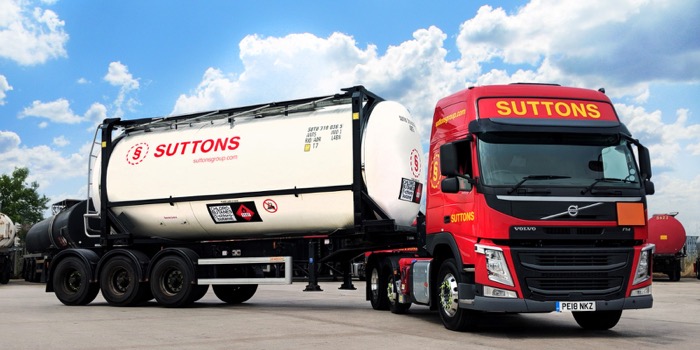Suttons on the impact of COVID-19 on supply chains and logistics businesses
The COVID-19 pandemic has had a significant impact on supply chains across the globe, particularly the ISO-tank market, which uses specialist equipment and relies on a balance of flows.
Keith Broom, Group Finance Director of Suttons Group, said the impact of ‘lockdowns’ initially hit the manufacturers of product at the beginning of the supply chain, starting in China and then progressively impacting Europe and the Americas. A fall in supply side demand came shortly after, again cycling from Asia to the Americas. This disruption led to erratic volumes and delays in discharging tanks, which in turn led to tank shortages in some areas.

He said: “Many sectors have seen a continuation of normal levels of demand, for example, chemicals used in the water treatment industry and foodstuffs. Other sectors have seen a severe decrease in volume, many of which are related directly or indirectly with the transport sectors and manufacturing. As the nation adapted to working from home the demand for petrol, diesel and fuel additives fell significantly in both the road and air markets. It is likely that demand will be slow to recover and if working from home and a reduction in long distance business travel continues in the long term, these industries may never return to pre-coronavirus levels. “
During the outbreak of the pandemic, he said Suttons’ first priority was the health and safety of its staff, both from a welfare perspective and on business level, “because without healthy staff we would be unable to meet our customers’ needs. As a global business we had an early test of our business continuity plans with the lockdown in China, which impacted us in late January.”
He said this tested the company’s ability to maintain its international operation with remote working and allowed it to iron out any minor issues: “As it became clear that COVID-19 was going to spread globally we introduced social distancing and hygiene measures, as well as providing PPE to allow staff to continue to work safely, while providing support for those who needed to shield due to age or for medical reasons.”
It quickly adapted its operations to ensure that it could maintain “the standards of safety and quality that our customers expect from us and to respond to changing demand patterns for certain products as already discussed. This included pro-actively marketing our capability to sectors where demand was increasing, or where new entrants were supporting the national effort to combat the ever-evolving pandemic.”
In conclusion, he said: “As we navigate through the pandemic, we are constantly reviewing the way in which we have managed the business and our operation, as well as how we have supported our employees and customers. Our existing business continuity plans worked well and allowed us to operate safely and maintain an excellent level of customer service, all while managing our cash flow. However, we are noticing areas where we could have done better or where additional investment in equipment, software, and training could improve our reaction to either a second wave of COVID-19 or some similar challenge in the future.”
For more information visit www.suttonsgroup.com
13th July 2020















